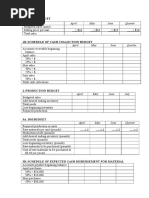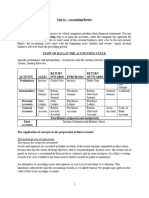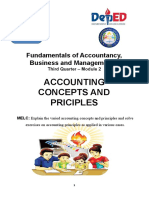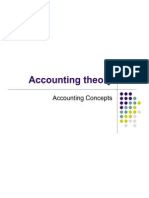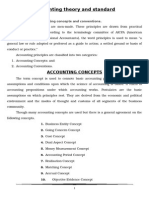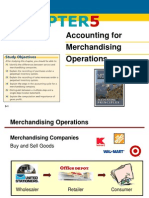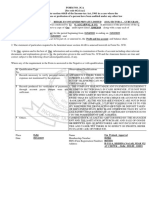Financial and Management Accounting
Uploaded by
yogipendliFinancial and Management Accounting
Uploaded by
yogipendliQ.1: Explain the Various accounting Concepts and Principles?
Concepts: Concepts take the form of assumptions or conditions, which guide the
accountants while preparing accounting statements.
Types of Accounting Concepts
As said earlier, concepts are the basic assumptions or conditions upon which the
science of accounting is based. There are five basic concepts of accounting, namely –
business entity concept, which is also termed as separate entity concept, going
concern concept, money measurement concept, periodicity concept and accrual
concept. Each concept is discussed below.
Business Separate Entity Concept: The essence of this concept is that business is
a separate entity and it is different from the owner or the proprietor. It is an economic
unit which owns its assets and has its own obligations. This enables the business to
segregate the transactions of the company from the private transactions of the
proprietor(s).
Going concern concept: The fundamental assumption is that the business entity
will continue fairly for a long time to come. There is no reason why an enterprise
should be promoted for a short period only to liquidate the business in the foreseeable
future. This assumption is called “going concern concept”.
This concept forms the basis for the distinction between expenditure that will yield
benefit over a long period of time (Fixed Assets) and expenditure whose benefit will
be exhausted in the short term (Current Asset). Similarly liabilities are classified as
short term liabilities and long term liabilities.
Money Measurement Concept: All transactions of a business are recorded in
terms of money. An event or a transaction that cannot be expressed in money terms,
cannot be accounted in the books of accounts.
Periodicity Concept: The time interval for which accounts are prepared is an
important factor even though we assume long life for a business. The accounting
period could be half year or even a quarter. The financial statements should be
prepared at the end of each accounting period so that income statement shows profit
or loss for that accounting period. So also a balance sheet is prepared to depict the
financial position of the business.
Financial and Management Accounting
Page 1
Accrual Concept: Profit earned or loss suffered for an accounting period is the result
of both cash and credit transactions. It is possible that certain incomes are earned but
not received and similarly certain expenses incurred but not yet paid during an
accounting period. But it is relevant to consider them while computing the financial
results just because they are related to the specific accounting period.
Accounting Principles: Accounting Principles are the rules basing on which
accounting takes place and these rules are universally accepted.
Principle of Income Recognition: According to this concept, revenue is considered
as being earned on the date on which it is realized, i.e., the date on which goods and
services are transferred to customers for cash or for promise. It should further be
noted that it is the amount which the customers are expected to pay which shall be
recorded. In effect, only revenue which is actually realized should be taken to profit
and loss account. Unrealized revenue should not be taken into consideration for
determining the profit.
Principle of Expense: Expenses are different from payments. A payment becomes
expenditure or an expense only when such payment is revenue in nature and made
for consideration.
Principle of Matching Cost and Revenue: Revenue earned during a period is
compared with the expenditure incurred to earn that income, whether the
expenditure is paid during that period or not. This is matching cost and revenue
principle, which is important to find out the profit earned for that period. Here costs
are reported as expenses in the accounting period in which the revenue associated
with those costs is reported.
Principle of Historical Costs: This is called ‘cost’ principle. All assets are recorded
at the cost of acquisition and this cost is the basis for all subsequent accounting for
the assets. The expenses and the goods purchased are shown at the value at which
they are incurred. The value of the assets is constantly reduced by charging
depreciation against their cost to present their book value in the balance sheet.
Principle of Full Disclosure: The business enterprise should disclose relevant
information to all the parties concerned with the organization. It means that any
information of substance or of interest to the average investors will have to be
disclosed in the financial statements.
Financial and Management Accounting
Page 2
Double Aspect Principle: This concept is the most fundamental one for accounting.
A business entity is an independent unit and it receives benefits from some and gives
benefits to some other. Benefit received and benefit given should always match and
balance.
Modifying Principle: The modifying principle states that the cost of applying a
principle should not be more than the benefit derived from. If the cost is more than
the benefit, then that principle should be modified. This is called cost-benefit principle.
There should be flexibility in adopting a principle and the advantage out of the
principle should over weigh the cost of implementing the principle.
Principle of Materiality: While important details of financial status must be
informed to all relevant parties, insignificant facts which do not influence any
decisions of the investors or any interested group, need not be communicated. Such
less significant facts are not regarded as material facts. What is material and what is
not material depends upon the nature of information and the party to whom the
information is provided. While income has to be shown for income tax purposes, the
amount can be rounded off to the nearest ten and fraction does not matter. The
statement of account sent to a debtor contains all the details regarding invoices
raised, amount outstanding during a particular period. The information on debtors
furnished to Registrar of Companies need not be in detail.
Principle of Consistency: Consistency is required to help comparison of financial
data from one period to another. Once a method of accounting is adopted, it should
not be changed. For instance if stock is valued under FIFO method in first year it
should be valued under the same method in the subsequent years also. Likewise if the
firm chooses to depreciate assets under diminishing balance method, it should
continue to do so year after year, unless the management takes a policy decision to
change the depreciation method. Any change in the accounting methods should be
informed to the concerned authorities with justification.
Principle of Conservatism or Prudence: Accountants follow the rule “anticipate
no profits but provide for all anticipated losses “. Whenever risk is anticipated
sufficient provision should be made. The value of investments is normally taken at
cost, even if the market value is higher than the cost. If the market value expected is
lower than the cost, then provision should be made by charging profit and creating
investment fluctuation fund. This is the principle of conservatism and it does not mean
that the income or the value of assets should be intentionally under stated.
Financial and Management Accounting
Page 3
Q.2: Pass journal entries for the following transactions
1. Madan commenced business with cash Rs. 70000
2. Purchased goods on credit 14000
3. Withdrew for private use 3000
4. Goods purchased for cash 12000
5. Paid wages 5000
Answer:
Solution:
Transaction Accounts affected Account to be debited and account to be
No in the books of the credited
business
01 Capital account and Cash account being real account is debited
cash account and Capital account being personal account is
credited
02 Goods account and Goods account being real account is debited
creditors account and creditor’s account being personal account
is credited
03 Personal drawings Drawings account being personal account is
account and cash debited and cash account being real account
account is credited
04 Goods account and Goods account being real account is debited
cash account and cash account being real account is
credited
05 Wages account and Wages account being nominal account is
cash account debited and cash account being real account
is credited
Accounting equations for the transactions
Liabilities + Owners
Assets =
Transacti Equity
on Debtors Furniture Creditors Madan's
Cash + Good +
+ + = + Capital
Financial and Management Accounting
Page 4
1 70,000 70,000
2 14,000 14,000
3 -3,000 -3,000
4 -12,000 12,000
5 -5,000 -5000
50,000 26,000 0 0 14,000 62,000
End
Equation
76,000 76,000
Q.3: Explain the various types of errors disclosed by Trial Balance?
Errors affecting Trial Balance or Errors Disclosed by Trial Balance:
If the Trial Balance does not tally, it will indicate that certain errors have been
committed which have affected the agreement of the Trial Balance. The accountant
will then proceed to find out the errors and ultimately the errors will be located. Such
errors are called ‘Errors Disclosed by Trial Balance or Errors which affect the
agreement of Trial Balance. Until such errors are rectified, the Trial Balance will not
agree. Some of these types of errors are as follows:
Wrong Casting: If the total of the Cash Book or some other Subsidiary Book is
wrong, the Trial Balance will not tally. For example, the total of the Purchase book has
been added Rs. 2000 in excess. When this total will be posted to the debit side of the
purchase account, it will also show an excess debit of Rs. 2000 and hence, the Trial
Balance will not tally.
Posting to the Wrong Side: If instead of posting an amount on the debit side of an
account, it is posted on the credit side, or vice versa, the Trial balance will not tally.
For example, goods for Rs. 2000 from Gopal. If instead of posting the amount on the
credit side of Gopal’s account it is posted to his debit, the debit side of the Trial
Balance will exceed the credit by Rs. 4,000.
Posting of Wrong Amount: The Trial Balance will not tally if the posting in an
account is made with an incorrect amount. For example, goods for Rs. 600 have been
Financial and Management Accounting
Page 5
purchased from Mahendra. If, it has been correctly entered in the Purchase Book or
purchase account, but while posting to Mehendra’s account, in credit side (correct
side) the amount posted is Rs. 60 instead of Rs. 600, the Trial Balance will not tally.
Omission of Posting of One Side of an Entry: For example if Rs. 500 have been
received from Ram and correctly entered in the Cash Book or Cash Account but if it is
mmitted to be posted on the credit side of Ram’s Account, the Trial Balance will not
tally.
Double Posting in a Single Account: For example if Rs. 500 have been received
from Shyam Lal and correctly entered in the Cash Account, but if it is posted twice on
the credit side of Shyam Lal’s account, the Trial Balance will not tally.
Errors of Totalling and Balancing of Accounts in the Ledger: Errors may occur
in the totaling of debit or credit sides of accounts in the Ledger or in the balancing of
accounts in the Ledger. Because the balances of accounts are transferred to the Trial
Balance, Then the Trial balance will not tally.
Q.4: From the following balances extracted from Trial balance, prepare
Trading Account.
The closing stock at the end of the period is Rs. 56000
Particulars Amount in Rs.
Stock on 1-1-2004 70700
Returns inwards 3000
Returns outwards 3000
Purchases 102000
Debtors 56000
Creditors 45000
Carriage inwards 5000
Carriage outwards 4000
Import duty on materials received from 6000
abroad
Clearing charges 7000
Rent of business shop 12000
Royalty paid to extract materials 10000
Fire insurance on stock 2000
Wages paid to workers 8000
Office salaries 10000
Cash discount 1000
Gas, electricity and water 4000
Sales 250000
Financial and Management Accounting
Page 6
Q.5: Differentiate Financial Accounting and Management accounting?
Distinction between Financial Accounting and Management Accounting
Financial accounting is the preparation and communication of financial information to
outsiders such as creditors, bankers, government, customers and so on. Another
objective of financial accounting is to give complete picture of the enterprise to
shareholders. Management accounting on the other hand aims at preparing and
reporting the financial data to the management on regular basis. Management is
entrusted with the responsibility of taking appropriate decisions, planning,
performance evaluation, control, management of costs, cost determination etc., For
both financial accounting and management accounting the financial data is the same
and the reports prepared in financial accounting are also used in management
accounting But the following are major differences between Financial accounting and
Management accounting.
Financial accounting Management accounting
· The primary users of financial · Top, middle and lower level
accounting information are managers use the information for
shareholders, creditors, planning and decision making
government authorities,
Financial and Management Accounting
Page 7
employees etc.,
· Accounting information is always · Management accounting may adopt
expressed in terms of money any measurement unit like labour
hours, machine hours or product
units for the purpose of analysis
· Financial data is presented for a · Reports are prepared on continuous
definite period, say one year or a basis, monthly or weekly or even
quarter daily
· Financial accounting focuses on · Management accounting is oriented
historical data towards future
· Financial accounting is a · Management accounting makes use
discipline by itself and has its own of other disciplines like economics,
principles, policies and conventionsmanagement, information system,
operation research etc.,
Q.6: Following is the Balance Sheet of M/s Srinivas Ltd. You are required to
prepare a Fund Flow Statement.
Particulars 2006 2007 Particulars 2006 2007
Equity Share 50,000 65,000 Cash 10,000 13,000
Capital balances
Profit & Loss 14,750 17,000 Debtors 25,000 27,000
Trade Creditors 29,000 31,000 Investment 5,000 nil
Mortgage 10,000 15,000 Fixed Assets 50,000 80,000
Short term loans15,000 16,500 Less: (5,250) (7000)
Depreciation
Accrued 8,000 7,500 Goodwill 5,000 nil
expenses
Stock 37,000 39,000
Total 1, 26,750 1, 52,000 Total 1, 26,750 1, 52,000
Additional Information:
1. Depreciation provided is Rs.1750.
2. Write off goodwill.
Financial and Management Accounting
Page 8
3. Dividend paid Rs.3500.
Financial and Management Accounting
Page 9
You might also like
- Disclosure Checklist For Medium Sized Companies67% (3)Disclosure Checklist For Medium Sized Companies54 pages
- Assignment On Financial and Management Accounting83% (12)Assignment On Financial and Management Accounting15 pages
- SMU A S: Finance and Management Accounting100% (1)SMU A S: Finance and Management Accounting14 pages
- Financial Reporting & Analysis Study MaterialNo ratings yetFinancial Reporting & Analysis Study Material127 pages
- Meaning and Nature of Accounting Principle: Veena Madaan M.B.A (Finance)No ratings yetMeaning and Nature of Accounting Principle: Veena Madaan M.B.A (Finance)25 pages
- Accounts Full_22480960_2025_01_13_20_26No ratings yetAccounts Full_22480960_2025_01_13_20_2669 pages
- Accounting Concepts and Principles Are A Set of Broad Conventions That Have Been Devised To Provide A Basic Framework For Financial ReportingNo ratings yetAccounting Concepts and Principles Are A Set of Broad Conventions That Have Been Devised To Provide A Basic Framework For Financial Reporting8 pages
- Basic Accounting Concepts, Conventions, Bases & Policies, Concept of Balance Sheet86% (7)Basic Accounting Concepts, Conventions, Bases & Policies, Concept of Balance Sheet44 pages
- Accounting Period Shareholders DividendsNo ratings yetAccounting Period Shareholders Dividends3 pages
- Accounting Concepts and Priciples: Fundamentals of Accountancy, Business and Management 1No ratings yetAccounting Concepts and Priciples: Fundamentals of Accountancy, Business and Management 110 pages
- Intermediate Financial Accounting: Submited By, Kayes Arman ID: 192-11-6265No ratings yetIntermediate Financial Accounting: Submited By, Kayes Arman ID: 192-11-626533 pages
- Accounting Concepts: They Are Useful in Preparing Financial Statements100% (1)Accounting Concepts: They Are Useful in Preparing Financial Statements9 pages
- Accounting Principles Costs & Conventions: Ravikant AgarwalNo ratings yetAccounting Principles Costs & Conventions: Ravikant Agarwal21 pages
- Hridey Goyal (DCA2204) Financial Accounting Assginment Sem 4th AnswerNo ratings yetHridey Goyal (DCA2204) Financial Accounting Assginment Sem 4th Answer11 pages
- Accounting Concepts: 1-Business Entity ConceptNo ratings yetAccounting Concepts: 1-Business Entity Concept20 pages
- Accounting Process and Principles, Financial, Cost and Management Accounting Author University of MumbaiNo ratings yetAccounting Process and Principles, Financial, Cost and Management Accounting Author University of Mumbai339 pages
- Majid 12 3762 1 Accounting Principles and ConceptsNo ratings yetMajid 12 3762 1 Accounting Principles and Concepts5 pages
- Topic: GAAP (Generally Accepted Accounting Principles) : Presented By: M.Nauman SherNo ratings yetTopic: GAAP (Generally Accepted Accounting Principles) : Presented By: M.Nauman Sher19 pages
- Financial Accounting - Want to Become Financial Accountant in 30 Days?From EverandFinancial Accounting - Want to Become Financial Accountant in 30 Days?3.5/5 (2)
- NKR Engineering (Private) Limited - June 2020No ratings yetNKR Engineering (Private) Limited - June 202019 pages
- Two Year Projected Financial Statements For Motorized BoatNo ratings yetTwo Year Projected Financial Statements For Motorized Boat5 pages
- 2020 08 08 16 32 44 678 - Aaecb8489p - 2019No ratings yet2020 08 08 16 32 44 678 - Aaecb8489p - 201916 pages
- Bangayan, Melody D. Discussion (Correction of Errors and Cash) PDFNo ratings yetBangayan, Melody D. Discussion (Correction of Errors and Cash) PDF5 pages
- Igcse Accounting Sole Trader Revision Questions F100% (1)Igcse Accounting Sole Trader Revision Questions F56 pages
- Financial Analysis of Infosys Technologies LTD.: Executive SummaryNo ratings yetFinancial Analysis of Infosys Technologies LTD.: Executive Summary47 pages
- Test Bank for Financial Accounting: Reporting, Analysis And Decision Making, 6th Edition, Shirley Carlon, Rosina McAlpine, Chrisann Lee, Lorena Mitrione, Ngaire Kirk Lily Wong - Full Version With All Chapters Is Ready For Download100% (2)Test Bank for Financial Accounting: Reporting, Analysis And Decision Making, 6th Edition, Shirley Carlon, Rosina McAlpine, Chrisann Lee, Lorena Mitrione, Ngaire Kirk Lily Wong - Full Version With All Chapters Is Ready For Download49 pages
- Financial Statement Analysis MCQs - Financial Statements MCQsNo ratings yetFinancial Statement Analysis MCQs - Financial Statements MCQs22 pages
- Students Feedback About The Learning OutcomesNo ratings yetStudents Feedback About The Learning Outcomes12 pages
- Module 3 and 4 - Cash To Accrual Basis, Single Entry and Correction of Errors - PP PDFNo ratings yetModule 3 and 4 - Cash To Accrual Basis, Single Entry and Correction of Errors - PP PDF13 pages
- Entrepreneurship Grade 11 Second Quarter ExamNo ratings yetEntrepreneurship Grade 11 Second Quarter Exam9 pages
- Meaning and Nature of Accounting Principle: Veena Madaan M.B.A (Finance)Meaning and Nature of Accounting Principle: Veena Madaan M.B.A (Finance)
- Accounting Concepts and Principles Are A Set of Broad Conventions That Have Been Devised To Provide A Basic Framework For Financial ReportingAccounting Concepts and Principles Are A Set of Broad Conventions That Have Been Devised To Provide A Basic Framework For Financial Reporting
- Basic Accounting Concepts, Conventions, Bases & Policies, Concept of Balance SheetBasic Accounting Concepts, Conventions, Bases & Policies, Concept of Balance Sheet
- Accounting Concepts and Priciples: Fundamentals of Accountancy, Business and Management 1Accounting Concepts and Priciples: Fundamentals of Accountancy, Business and Management 1
- Intermediate Financial Accounting: Submited By, Kayes Arman ID: 192-11-6265Intermediate Financial Accounting: Submited By, Kayes Arman ID: 192-11-6265
- Accounting Concepts: They Are Useful in Preparing Financial StatementsAccounting Concepts: They Are Useful in Preparing Financial Statements
- Accounting Principles Costs & Conventions: Ravikant AgarwalAccounting Principles Costs & Conventions: Ravikant Agarwal
- Hridey Goyal (DCA2204) Financial Accounting Assginment Sem 4th AnswerHridey Goyal (DCA2204) Financial Accounting Assginment Sem 4th Answer
- Accounting Process and Principles, Financial, Cost and Management Accounting Author University of MumbaiAccounting Process and Principles, Financial, Cost and Management Accounting Author University of Mumbai
- Majid 12 3762 1 Accounting Principles and ConceptsMajid 12 3762 1 Accounting Principles and Concepts
- Topic: GAAP (Generally Accepted Accounting Principles) : Presented By: M.Nauman SherTopic: GAAP (Generally Accepted Accounting Principles) : Presented By: M.Nauman Sher
- Financial Accounting - Want to Become Financial Accountant in 30 Days?From EverandFinancial Accounting - Want to Become Financial Accountant in 30 Days?
- Two Year Projected Financial Statements For Motorized BoatTwo Year Projected Financial Statements For Motorized Boat
- Bangayan, Melody D. Discussion (Correction of Errors and Cash) PDFBangayan, Melody D. Discussion (Correction of Errors and Cash) PDF
- Financial Analysis of Infosys Technologies LTD.: Executive SummaryFinancial Analysis of Infosys Technologies LTD.: Executive Summary
- Test Bank for Financial Accounting: Reporting, Analysis And Decision Making, 6th Edition, Shirley Carlon, Rosina McAlpine, Chrisann Lee, Lorena Mitrione, Ngaire Kirk Lily Wong - Full Version With All Chapters Is Ready For DownloadTest Bank for Financial Accounting: Reporting, Analysis And Decision Making, 6th Edition, Shirley Carlon, Rosina McAlpine, Chrisann Lee, Lorena Mitrione, Ngaire Kirk Lily Wong - Full Version With All Chapters Is Ready For Download
- Financial Statement Analysis MCQs - Financial Statements MCQsFinancial Statement Analysis MCQs - Financial Statements MCQs
- Module 3 and 4 - Cash To Accrual Basis, Single Entry and Correction of Errors - PP PDFModule 3 and 4 - Cash To Accrual Basis, Single Entry and Correction of Errors - PP PDF




